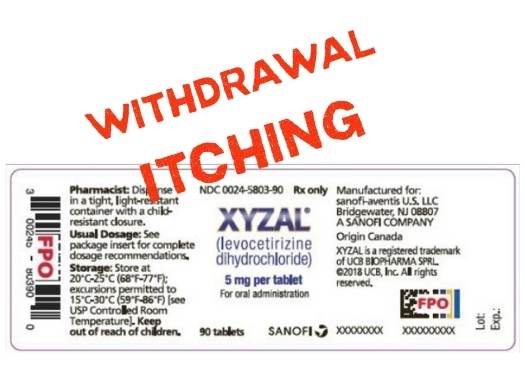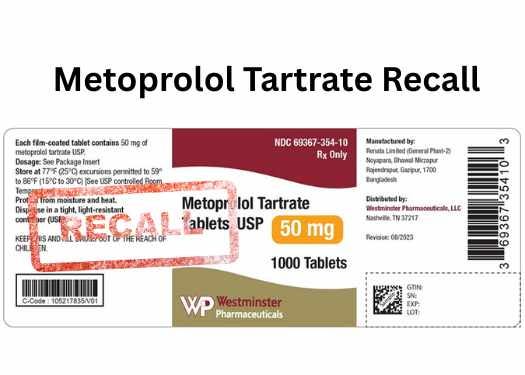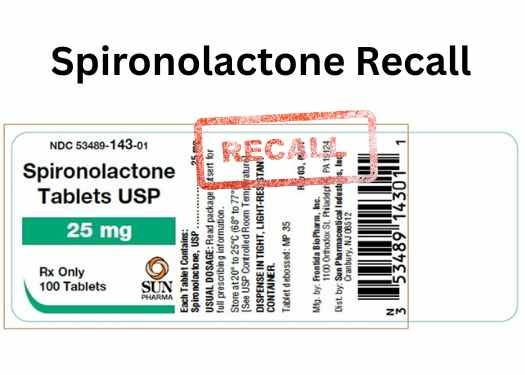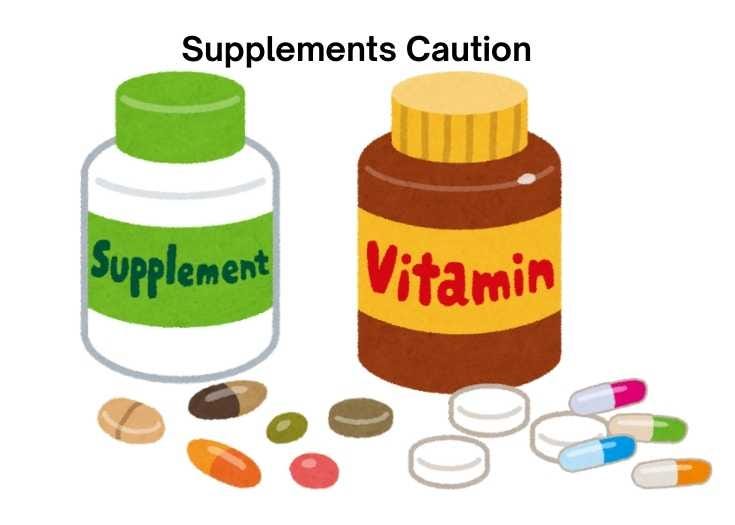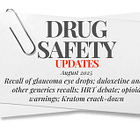August 2025 Safety Update Part 2: Liver Injury and MS Drugs; Xyzal Warning; Recalls for Metoprolol, Spironolactone, Compounded GLP-1s; Supplements and Vitamins Tips
Liver Injury Warnings for MS Drugs
Four multiple sclerosis (MS) drugs have new warnings about the risk of serious drug-induced liver injury. Prior to starting these therapies, patients must have liver function tests to assess liver enzymes and bilirubin levels. Signs of liver injury have occurred weeks to months after taking the drug. Symptoms that may indicate liver injury include new or worsening fatigue, anorexia, nausea, vomiting, right upper abdominal discomfort, dark urine, or yellowing of the skin or eyes (jaundice).
All of the MS medications with the new warnings are a specific type of monoclonal antibody medication called “anti-CD20 monoclonal antibodies.” Patients taking these drugs are also screened for Hepatitis B before beginning treatment because the medications may trigger reactivation of the virus. The new warning about serious liver injury is not hepatitis-related. In published case studies, liver function improved and resolved after discontinuing the medication.
Ocrevus (ocrelizumab and hyaluronidase-ocsq) intravenous infusion
Ocrevus is administered by IV twice a year. It was approved in 2017.
Ocrevus Safety Label Change
Ocrevus Zunovo (ocrelizumab and hyaluronidase-ocsq) subcutaneous injection
Ocrevus Zunovo is administered by subcutaneous injection twice a year. It was approved in 2024.
Ocrevus Zunovo Safety Label Change
Briumvi (ublituximab-xiiy) intravenous infusion
Briumvi is taken every 24 weeks after the first two doses, which are taken two weeks apart. It was approved in 2022.
Briumvi Safety Label Change
Kesimpta (ofatumumab) subcutaneous injection
Kesimpta is taken monthly after the first three doses, which are taken one week apart. Kesimpta was approved in 2009 under the name of Arzerra, an intravenous infusion formulation that treats leukemia. In 2020, Novartis received additional approval for Kesimpta, which uses the same ingredient in a subcutaneous formulation, for treating relapsing forms of multiple sclerosis (RMS).
Although Kesimpta (ofatumumab) has a new warning about liver injury, some studies have shown that the risk of liver injury is lower than with ocrelizumab.
Frontiers in Neurology: “Successful switch to ofatumumab after liver injury associated with ocrelizumab treatment in multiple sclerosis: a case report”
Xcopri (cenobamate) Tablets and Liver Injury
Epilepsy drug Xcopri has a new warning about reports of clinically significant liver injury. Prior to starting the medication, patients must have liver function tests to assess liver enzymes and bilirubin levels.
The patient medication guide adds a section on the risk of problems with the electrical system of the heart (QT shortening). Symptoms of QT shortening including fast heartbeat (heart palpitations) that last a long time or fainting. Xcopri was approved in 2020 and treats partial-onset seizures (focal seizures) in adults.
Read more about focal onset seizures at the Epilepsy Foundation.
Xyzal (levocetirizine dihydrochloride) Tablets and Withdrawal Itching
Prescription-strength allergy drug Xyzal has a new warning about the risk of extreme itching that may occur after stopping the medication after long-term use. The itching (or pruritus) may occur within a few days after discontinuation. If extreme itching does occur, symptoms may improve by restarting the medication or tapering the dose gradually.
So far, the over-the-counter versions of levocetirizine dihydrochloride have not yet been updated with this warning. Ceterizine (Zyrtec brand name) is also slated to have a similar warning added to its label. We reported on this topic in June: “Beware of Itching after Discontinuing These Allergy Drugs.”
13 reports of itching with Xyzal on Ask a Patient website
More than 100 Reports of Itching with Zyrtec on Ask a Patient website
Drug Recall: Metoprolol Tartrate Tablets
Westminster Pharmaceuticals is recalling 16,672 1000-count bottles of Metoprolol Tartrate tablets (50 mg) and 4,456 1000-count bottles of Metoprolol Tartrate tablets (100 mg) due to the presence of nitrosamine above the acceptable daily limit. Nitrosamine impurities may increase the risk of cancer. The drug was manufactured by Renata PLC in Bangladesh. Metoprolol tartrate (Lopressor brand name) is a beta blocker treatment for high blood pressure. This recall began on August 6, 2025 and is a supplier-level recall. Consumers may wish check the Enforcement Report for specific batch numbers, lot numbers, and expiration dates.
FDA Enforcement Report
Read patient testimonials about metoprolol tartrate or Lopressor at Ask a Patient.
Drug Recall: Spironolactone Tablets
Sun Pharmaceuticals is recalling 11,328 100-count bottles of Spironolactone tablets (25 mg) due to the presence of a foreign substance, which has been identified as aluminum. The drug was manufactured by Frontida BioPharm, Inc. in Philadelphia, PA. Spironolactone (generic for Aldactone) treats high blood pressure, heart failure, edema (swelling), and cirrhosis. It is sometimes taken off-label for excessive hair growth, PCOS (polycystic ovarian syndrome) and acne. The recall began on August 5, 2025 and is a supplier-level recall. Consumers may check the Enforcement Report for specific batch numbers, lot numbers, and expiration dates.
FDA Enforcement Report
Find 274 patient testimonials about Spironolactone and 154 patient testimonials about Aldactone at Ask a Patient
Drug Recall: Compounded Semaglutide and Tirzepatide
Aequita Pharmacy, a licensed compounding pharmacy in Kirkland, Washington, is recalling over 2,000 multi-dose vials of injectable GLP-1 semaglutide and tirzepatide products because of “a lack of processing controls.” Lack of oversight in the compounding facility could impact medication sterility, dosage accuracy, and stability.
Semaglutide is the active ingredient in Novo Nordisk’s diabetes drug Ozempic and weight loss drug Wegovy. Strengths of the recalled semaglutide products ranged from .22 mg to 2.67 mg. Tirzepatide is the active ingredient in Eli Lilly’s diabetes drug Mounjaro and weight loss drug Zepbound. Strengths of the recalled tirzepatide products ranged from 2.2 mg to 16.6 mg. The recall began on July 18, 2025. Check the Enforcement Report for more product information.
FDA Enforcement Report
The Hill recently reported that online platforms (retailers and telehealth sites) are still flooding the market with illegal versions of semaglutide and other GLP-1 drugs:
“Copycat Ozempic, Mounjaro proliferate even in postshortage era”
Supplement Tips: Nutrafol Hair Growth Supplement
Consumer Lab’s Todd Cooperman, MD warns that Nutrafol, a popular dietary supplement taken to promote hair growth, contains concentrations of vitamins and minerals that could be excessive for some people. For example, Nutrafol contains 2,500 IU of vitamin D, which is three to four times as much as most adults need.
Nutrafol Men and Nutrafol Women supplements also contain 1,563 mcg (174% of the daily recommended value) of vitamin A (as beta-carotene). Cooper says that vitamin A supplementation is not recommended for the general population. In fact, too much vitamin A can cause hair loss.
The supplements also contain 3,000 mcg (10,000% DV) of biotin, 225 mcg (150% DV) of iodine from kelp, 25 mg (227% DV) of zinc, and 200 mcg (364% DV) of selenium. High amounts of biotin may reduce the absorption of anti-seizure meds and interfere with laboratory tests. Read more about hair growth dietary supplements (including Viviscal, which has a proprietary blend of “shark and mollusk powder”) at Consumer Lab:
Do Any Supplements Help for Hair Loss? (update on Nutrafol ingredients)
(This article is paywalled for members-only, but abstract is available.)
Nutrient Recommendations Calculator
Check out this USDA calculator to for a personalized daily nutrient recommendation based on your sex, weight, height, age, and activity level. The Dietary Reference Intakes (DRIs) were established by the Health and Medicine Division of the National Academies of Sciences, Engineering and Medicine. The nutrient recommendations include amounts of macronutrients, water, vitamins, and minerals you should be taking each day. In addition to the recommended amounts, the results also show the “tolerable” amounts of vitamins and minerals per day.
National Agricultural Library: Dietary Reference Intake Calculator
Dr. Lucy McBride, writer of “Are You Okay?” recently answered reader-submitted questions about:
Restless Leg Syndrome: What are the causes and is it treatable without taking medication?
Low Blood Pressure: Should aging adults with low blood pressure consider Salt and Mineral supplements?
Hand tremors: Should a healthy 58-year old woman be concerned about a fine tremor in her hands?
Please visit our website at www.askapatient.com for more on drugs and treatments! Check out the archive of newsletters sent in 2025 using the Sitemap.
Did you miss the last edition of this newsletter? Read it here:

